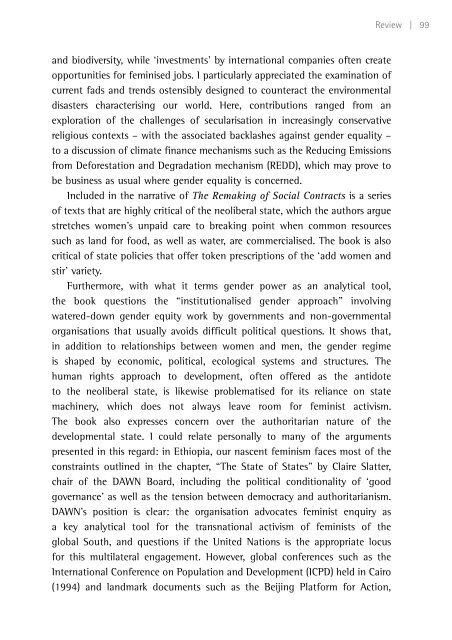The politics of fashion and beauty in Africa
fa21_proof_3
fa21_proof_3
Create successful ePaper yourself
Turn your PDF publications into a flip-book with our unique Google optimized e-Paper software.
<strong>and</strong> biodiversity, while ‘<strong>in</strong>vestments’ by <strong>in</strong>ternational companies <strong>of</strong>ten create<br />
opportunities for fem<strong>in</strong>ised jobs. I particularly appreciated the exam<strong>in</strong>ation <strong>of</strong><br />
current fads <strong>and</strong> trends ostensibly designed to counteract the environmental<br />
disasters characteris<strong>in</strong>g our world. Here, contributions ranged from an<br />
exploration <strong>of</strong> the challenges <strong>of</strong> secularisation <strong>in</strong> <strong>in</strong>creas<strong>in</strong>gly conservative<br />
religious contexts – with the associated backlashes aga<strong>in</strong>st gender equality –<br />
to a discussion <strong>of</strong> climate f<strong>in</strong>ance mechanisms such as the Reduc<strong>in</strong>g Emissions<br />
from Deforestation <strong>and</strong> Degradation mechanism (REDD), which may prove to<br />
be bus<strong>in</strong>ess as usual where gender equality is concerned.<br />
Included <strong>in</strong> the narrative <strong>of</strong> <strong>The</strong> Remak<strong>in</strong>g <strong>of</strong> Social Contracts is a series<br />
<strong>of</strong> texts that are highly critical <strong>of</strong> the neoliberal state, which the authors argue<br />
stretches women’s unpaid care to break<strong>in</strong>g po<strong>in</strong>t when common resources<br />
such as l<strong>and</strong> for food, as well as water, are commercialised. <strong>The</strong> book is also<br />
critical <strong>of</strong> state policies that <strong>of</strong>fer token prescriptions <strong>of</strong> the ‘add women <strong>and</strong><br />
stir’ variety.<br />
Furthermore, with what it terms gender power as an analytical tool,<br />
the book questions the “<strong>in</strong>stitutionalised gender approach” <strong>in</strong>volv<strong>in</strong>g<br />
watered-down gender equity work by governments <strong>and</strong> non-governmental<br />
organisations that usually avoids difficult political questions. It shows that,<br />
<strong>in</strong> addition to relationships between women <strong>and</strong> men, the gender regime<br />
is shaped by economic, political, ecological systems <strong>and</strong> structures. <strong>The</strong><br />
human rights approach to development, <strong>of</strong>ten <strong>of</strong>fered as the antidote<br />
to the neoliberal state, is likewise problematised for its reliance on state<br />
mach<strong>in</strong>ery, which does not always leave room for fem<strong>in</strong>ist activism.<br />
<strong>The</strong> book also expresses concern over the authoritarian nature <strong>of</strong> the<br />
developmental state. I could relate personally to many <strong>of</strong> the arguments<br />
presented <strong>in</strong> this regard: <strong>in</strong> Ethiopia, our nascent fem<strong>in</strong>ism faces most <strong>of</strong> the<br />
constra<strong>in</strong>ts outl<strong>in</strong>ed <strong>in</strong> the chapter, “<strong>The</strong> State <strong>of</strong> States” by Claire Slatter,<br />
chair <strong>of</strong> the DAWN Board, <strong>in</strong>clud<strong>in</strong>g the political conditionality <strong>of</strong> ‘good<br />
governance’ as well as the tension between democracy <strong>and</strong> authoritarianism.<br />
DAWN’s position is clear: the organisation advocates fem<strong>in</strong>ist enquiry as<br />
a key analytical tool for the transnational activism <strong>of</strong> fem<strong>in</strong>ists <strong>of</strong> the<br />
global South, <strong>and</strong> questions if the United Nations is the appropriate locus<br />
for this multilateral engagement. However, global conferences such as the<br />
International Conference on Population <strong>and</strong> Development (ICPD) held <strong>in</strong> Cairo<br />
(1994) <strong>and</strong> l<strong>and</strong>mark documents such as the Beij<strong>in</strong>g Platform for Action,<br />
Review | 99



